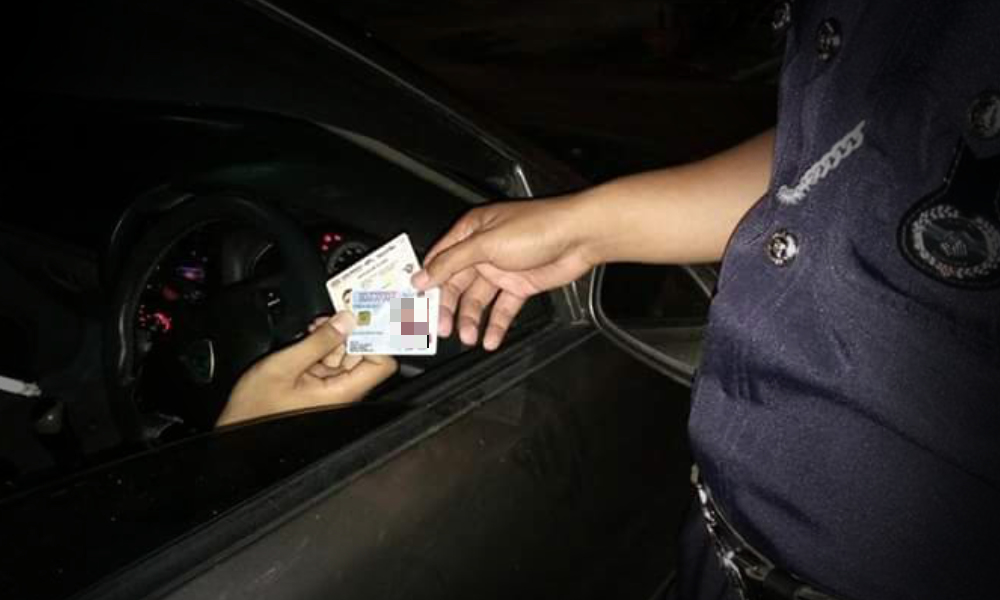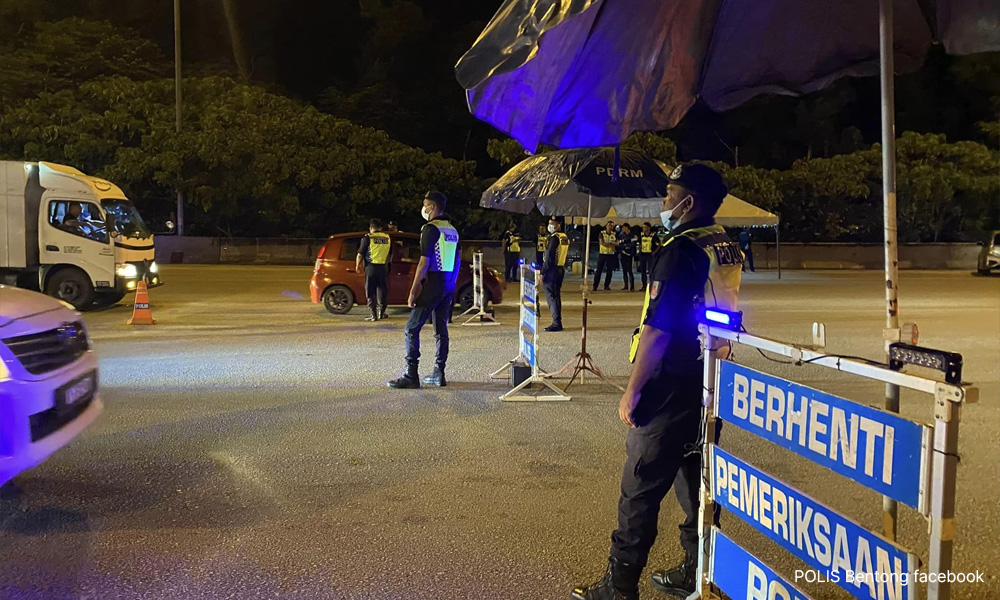Two weeks ago, a news anchor shared his unpleasant encounter with two police officers patrolling his neighbourhood, via a letter column of a news media.
In the letter, he claimed that two officers approached him around 1am as he was sitting in his car, parked in front of his house. Despite complying with their request for his MyKad - bearing the same address as his residence - and explaining that he had just returned from work, he was asked to step out of the car without any explanation.
The news anchor claimed that one of the officers exhibited rude, arrogant and unprofessional behaviour. Expressing disappointment, he stressed on the need for policemen to prioritise courtesy when dealing with the public in his published letter.
Following the letter’s publication, and upon finding its content untrue and damaging to the image of the police, the officer decided to lodge a police report.
The news anchor is now being investigated under Section 504 of the Penal Code for intentional insult. He is also being investigated under Section 233 of the Communications and Multimedia Act 1988 which covers misuse of network facilities.
Unpleasant encounters
I am sure many of us have our own tales to tell, about unpleasant encounters with police officers. I too have a series of experiences dealing with the police.
A few months ago, I made a police report at a nearby police station upon finding out my photo was being used by scammers trying to attract investors on Telegram. The officer whom I met told me that I should lodge the report at the police station in the same area where I had initially found out about the matter, which was almost an hour’s drive away.
I insisted that the officer make a phone call to the said police station to ask if I could make the report from 40km away. I wasn’t willing to travel for an hour just to submit a report especially when there are so many other ways to communicate regarding the matter.

After a while, the officer obliged. In the end, the report was settled via a computer system and my statement was taken via a phone call.
I remember wondering at the time, the logic behind the officer’s advice to have me drive to another police station to do something that I could do right there. Did he not know any better?
Had I not insisted for him to make the call, would I have been forced to make the one-hour drive just to protect myself and my identity?
I learned a crucial lesson that day. I learned that police officers are also humans, just like us. They make mistakes and they deserve our understanding. At the end of the day, what’s important is to work together to find solutions to our problems.
More encounters
A few years ago, I was stopped by a police officer at a roadblock in Kuala Lumpur. I was returning home after a theatre show and a late supper afterwards.
The officer instructed me to wind down my window and flashed his torchlight at the backseat of the car as if he were looking for something. He then asked me what I was doing outside after midnight.
I was taken aback at the time. I mean, I would have understood if the question came from my mother who is always eager to know my whereabouts - but a police officer? Nah, I did not think it was his place to ask me such a question.
READ MORE: KINIGUIDE | What to do when stopped by police
When I failed to respond, he said to me, “Shouldn’t you be at home?”
I forced a smile and did not say a word. My stubborn head kept telling me that he wasn’t my mother and he did not deserve an answer.
The officer then tapped my car twice and said, “Okay, get home safe.”
I drove off that night, genuinely confused - was he sticking his nose where it did not belong, or was he just being nice?
I learned a crucial lesson that day - that police officers are also humans, just like us. They are capable of being sensitive and caring for our well-being. We should not expect them to be emotionless.
In the past, I have had several police reports filed against me, sometimes regarding the content of my theatre play and sometimes my articles. When I am asked to show up at the police station for questioning or having my statement taken, I always remind myself to menurut perintah (obey).
I have learned that police officers can be strict and condescending, and are very much capable of making you feel like a tiny fly on the wall, waiting to be slapped by a broomstick. But when you can put aside your ego (and fear), and you learn to talk to them respectfully, it is always easier to find an understanding.
Instructed to open the bonnet
My two children are now working adults in Kuala Lumpur. Living up north, far from them, I am always concerned for their well-being. In my absence, I am always hopeful that my experiences and advice will make it up as a guide for them.
Recently, my son experienced a similar encounter as the news anchor. Boy, am I glad that he clearly remembered my advice to menurut perintah.
During the incident, my son had just left his apartment when he was stopped at a roadblock. He slowed down and voluntarily wound down his window.
This is when my son overheard an officer asking another, “Nak check apa?” (What do we check?)
One of the officers then asked my son a series of questions.
“Dari mana?” (Where are you coming from?)
“Rumah mana?” (Where is your house?)
“Nak ke mana?” (Where are you going?)
“Kerja apa?” (What do you work as?)
Upon answering all the questions, the officer then asked for my son’s MyKad and driving licence. He took some time to check them before asking my son to park the car at the curb. My son obliged.
Having parked his car some 20m away, the officer then instructed my son to open the car bonnet.
“Kenapa tuan?” (Why sir?)
“Nak check” (I want to check).
My son could not accept the officer’s reply as a valid reason to give him access to the bonnet, but he did not want to create any unnecessary tension.
When my son unlocked the car and stepped out, the officer stopped him and told him that he could stay inside the car.
"Takpa tuan, saya boleh tolong," my son casually offered to help the officer open the bonnet for inspection.
The officer took some time to go through several items inside the bonnet before returning my son’s MyKad and licence, allowing him to leave.
Is it difficult to cooperate?
I know it is scary for people to be stopped by police officers. It gets scarier when you think the officer is rude and acting like a bully or violating your rights. However, the situation will not become easier if you show your anger and resentment.

After all, most police encounters at a roadblock are completed in a matter of a few minutes. How difficult is it to put aside your frustration and cooperate for that short period?
I always believe in giving others reasonable doubt. I generally believe police officers do not go out in the field wishing to flaunt their power and authority or to make a quick buck.
Although there have been cases of police misconduct, I believe it is not fair to treat the entire police force as if they are all flawed and are out to get us.
I believe, if you don’t want to be treated harshly, just do what you are told. Don’t argue, don’t threaten, don’t show aggression and don’t initiate any physical confrontation.
I agree the members of the community deserve courtesy, respect and professionalism from police officers. I agree that every person being stopped by an officer should feel safe instead of feeling that their well-being is in jeopardy.
But shouldn’t we too extend the same courtesy to police officers who put their lives in danger every time they go out on duty?
After all, a police officer who stops you, asks you to wind down the window or instructs you to step out of the car doesn’t know who you are. He is trained to control every encounter and is most possibly always concerned for his safety.
We don’t always know what is on their mind when we are stopped. Perhaps there has been a burglary in the neighbourhood. Perhaps there has been a shooting. Perhaps an armed fugitive is on the loose. As ordinary people, we just don’t know.
For us, this might be a simple traffic stop. But for the police officer, each traffic stop is a potentially dangerous encounter.
If we want the police to help us when we need their assistance, it is only right for us to let them do their job and leave no doubt that they will do theirs.
After all, if you strongly believe that your rights were violated during a roadblock or any other encounter with the police, you can always find your way to the police station and exercise your rights by lodging a police report. - Mkini
FA ABDUL is a multi-award-winning playwright and director in the local performing arts scene, a published author, television scriptwriter, media trainer, and mother. Her ultimate mission in life is to live out of a small suitcase.
The views expressed here are those of the author/contributor and do not necessarily represent the views of MMKtT.




No comments:
Post a Comment
Note: Only a member of this blog may post a comment.